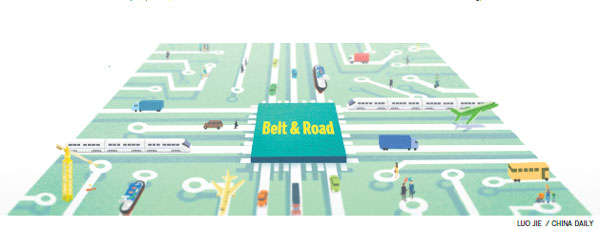Belt, Road build new economic links
By Christine Lagarde (China Daily) Updated: 2017-05-16 08:07When I first heard about the Belt and Road Initiative, I thought about something simple and straightforward - like a fragrant cup of tea.
For centuries, tea has brought cultures, communities, and people closer together. For centuries, tea has connected economies through trade and investment. And only recently, Chinese scientists have unlocked the genetic secrets of the tea plant - raising the prospect that we may soon enjoy a range of new flavors.
The Belt and Road Initiative holds a similar promise. This is about connecting cultures, communities, economies, and people. It is about rejuvenating ancient trade routes and building new ones. It is also about adding new economic flavors by creating infrastructure projects that are based on 21st-century expertise and governance standards.
Delivering on this promise is not an easy task - but doing so could bring enormous benefits, especially in three areas:
First, high-quality infrastructure could help close the developing-country infrastructure gap of about $1.5 trillion per year, lift potential global growth, and raise the incomes of millions of people. As the Chinese proverb goes: "To become rich, one must first build roads."
A second benefit is greater inclusiveness. Think of new ports, roads, and power grids that allow developing countries to better connect with global supply chains. And think of improved roads in rural areas that can boost productivity, school enrolment, and access to health services. By sharing the benefits of investment and knowledge more broadly, growth will be stronger, more durable, and more inclusive.
A third benefit is stronger economic cooperation - including on the business and regulatory environment. This would help boost global trade, investment, and financial cooperation, and make it easier to share the benefits of growth more widely. All this is good for consumers, good for productivity, and good for poverty reduction.
The IMF has shown over many decades that it can help in this effort - by providing policy advice, financial support when needed, and hands-on training and capacity building - so that economies can reap the benefits of trade and investment.
Many countries - from Cambodia, to the Kyrgyz Republic, to Togo - have used new IMF tools to help design and implement infrastructure investment, while seeking to maintain macroeconomic stability and enhance governance. We also support more than 100 countries per year in their efforts to generate higher government revenue that can be used for fresh investment.
We are proud to serve our 189 member countries every day - and we are deeply committed to helping them maximize the benefits of more investment, trade, financial connectivity, and people-to-people bonds under the Belt and Road Initiative.
Together, we can create something new - by combining proven policy ingredients with new economic flavors.
The author is IMF managing director. The article is her opening remarks at the Belt and Road Forum on May 14.

- 'Cooperation is complementary'
- Worldwide manhunt nets 50th fugitive
- China-Japan meet seeks cooperation
- Agency ensuring natural gas supply
- Global manhunt sees China catch its 50th fugitive
- Call for 'Red Boat Spirit' a noble goal, official says
- China 'open to world' of foreign talent
- Free trade studies agreed on as Li meets with Canadian PM Trudeau
- Emojis on austerity rules from top anti-graft authority go viral
- Xi: All aboard internet express











